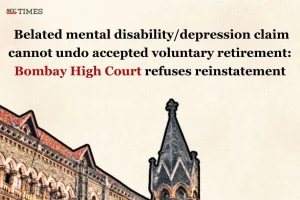Bombay High Court: In a writ petition filed under Article 226 of the Constitution of India challenging the acceptance of voluntary retirement, where the employee had tendered resignation citing health reasons and depression, a Division Bench of Kishore C. Sant* and Abasaheb D. Shinde, JJ., held the petition not maintainable. The Court emphasised that once resignation has been accepted and acted upon in accordance with the Maharashtra Civil Services (Pension) Rules, 1986 (‘Pension Rules’), there is no provision to reinstate the employee into service. The Court observed that the claim of mental disability raised for the first time after retirement could not undo the resignation, and allowing such relief would amount to directing the authorities to act against the Rules, which is impermissible.
Background:
The petitioner joined the State service as a Medical Officer on 22-06-2002. After losing her husband to a heart attack, she sought earned leave in February 2023 for her daughter’s examination, which was denied. On 05-04-2023, she applied for voluntary retirement effective 04-07-2023, citing health and personal reasons, but later attempted to withdraw the notice on 17-04-2023. Though initially informed that her resignation was not accepted, by communication dated 04-07-2023, her resignation was ultimately accepted, and she stood retired.
On 20-11-2023, four months after retirement, she wrote to the Principal Secretary claiming she had applied under depression and had not taken up any other employment. The Chief Administrative Officer rejected her request for reinstatement, citing Rules 66(1)-(5) of the Pension Rules, which bar re-entry into service once resignation is accepted.
She then approached the Maharashtra Administrative Tribunal (‘MAT’), challenging the order of 04-07-2023 as arbitrary, but her application was dismissed on 29-01-2025 under Rule 66(5) of the Pension Rules. Aggrieved, she filed the present writ petition before the Court, arguing that her case should be considered under the Rights of Persons with Disabilities Act, 2016 (‘Disabilities Act’), as mental illness is recognised under Section 2(5) of the Disabilities Act. The State opposed, contending that the disability claim was raised only after retirement, lacked supporting evidence, and that she had already withdrawn service benefits, estopping her from reinstatement.
Analysis and Decision:
The Court emphasised that the facts were undisputed, where except for the averments in the petition, no material was produced to show that the petitioner was suffering from any mental disability. It was observed that it was only after the voluntary resignation was accepted that one friend noticed abnormal behaviour and took her to a psychiatric, who opined that she was suffering from depression. However, the Court highlighted that no such certificate was produced on record. It was further noted that before the MAT, no ground of disability was raised, and for the first time such ground was raised in the present petition.
The Court noted that the resignation was rightly accepted by following due procedure from the intended date. It was emphasised that notice of three months was given on 05-04-2023 and the resignation was accepted from 04-07-2023, hence no illegality was committed. The Court observed that by way of writ petition, the petitioner was seeking something against the Pension Rules by making out a different case for the first time. It was highlighted that no illegality was pointed out in the acceptance of voluntary resignation, and it was only urged that the authorities should have noticed abnormal behaviour and concluded mental disability. However, it was noted that no such material was produced even before this Court.
The Court further observed the precedent in State of U.P. v. Harish Chandra, (1996) 9 SCC 309, where the Supreme Court held that writ jurisdiction cannot be used to direct authorities to act in violation of the Rules or against the law, and emphasised that allowing the writ petition would amount to directing the authorities to act against the Rules, which is not permissible.
The Court highlighted that if it was truly a case of disability, the petitioner ought to have approached the Commissioner under the Disabilities Act, as it is the Commissioner who has the power under the Disabilities Act to grant appropriate relief. It was noted that not approaching the Commissioner at the first instance shows that the theory of disability was developed only after losing before the MAT.
Consequently, the Court dismissed the petition with no order as to costs. The Court further directed that the rule stands discharged.
[Mahananda Mahadev Jaybhaye-Munde v. State of Maharashtra, 2025 SCC OnLine Bom 4705, decided on 25-11-2025]
*Judgment authored by: Justice Kishore C. Sant
Advocates who appeared in this case:
For the Petitioner: Santosh S. Jadhavar, Advocate
For the Respondents: P. K. Lakhotiya, AGP


